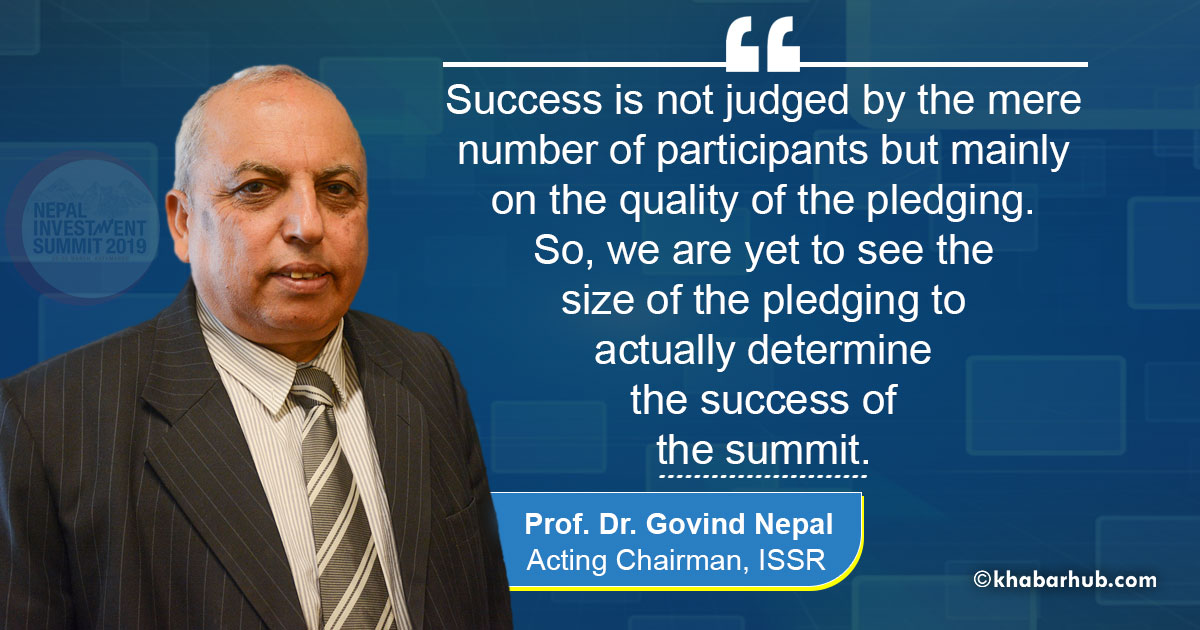Economist and former Member of the National Planning Commission, and former Chief Economic Adviser to the Ministry of Finance, Prof. Dr. Govind Nepal talks about the ongoing Nepal Investment Summit 2019. Khabarhub caught up Prof. Nepal for his views. Excerpts:
How do you assess the first day of the Nepal Investment Summit-2019?
Despite some discontentment from some quarters that this summit lacked sufficient preparation, and that the environment to host was not matured enough, the first day of the summit went well considering the significant number of enthusiastic participants.
Nonetheless, success is not judged by the mere number of participants but mainly on the quality of the pledging. So, we are yet to see the size of the pledging to actually determine the success of the summit.
What differences did you find between the 2017 and this summit?
The government has enacted two acts crucial for foreign investment. The government has come up with 77 projects with serious homework. They all underwent pre-feasibility studies and contain details on the technical and financial aspects of the projects. Unlike in the past, the investor should be eligible to pledge for a project.
Media have been critical to this summit saying that the country lacks an investment-friendly environment. What do you have to say?
Of course, it would have been better if more acts towards easing FDI were enacted, and if the government had more time to prepare for this summit. Yet, the summit was the necessity of the hour. The investment summit came up because of our need rather than the investors’ interests.
Government’s main agenda is economy and the government is preparing for the 15th development plan which will be implemented from 16 July this year. To achieve prosperity, the government has to invest a huge amount in the sector of infrastructure and productive sectors. But we have limited financial resources as compared to the required investment. Thus, we have to look at FDI as an only alternative source for carrying out big projects.
Isn’t the ‘Biplav’ outfit a serious security threat given its destructive activities already?
The issue of security regarding the ‘Biplav’ outfit that media has been raising is in fact, a political issue. As a matter of fact, the ‘Biplav’ issue may not be as big as hyped by the media.
The government is capable enough to tackle this problem through a political approach since it has already had past experience in resolving such an issue.
This summit brings together over 500 participants. The investors are well informed of the investment climate in the country. Investors take some predictable risks. They are here following a full assessment of the investment climate. A positive sign that this summit has attracted a significant number of investors.
Nepal’s immediate neighbor, India also offers a tremendous possibility for investors as a developing country. Why should one invest in Nepal?
Investors come from different perspectives. The notion of Nepal being a landlocked country is waning through increasing connectivity and trade facilitation process in the sub-region. For example, if they want to invest in hydro, there will be an agreement between the importing country and the investors. Until that is done they won’t invest. Exporting energy to India and Bangladesh is now much easier than before.
If they want to invest in a road project, they need not export anything at all. They just collect toll tax and reap profits. In agriculture, they may invest in high-value crops export it in the international market. Thus, we have different products.
Besides, we should not forget our domestic market when we talk of FDI. A glowing example is that of Ncell.
There are reports that Nepal has high labor wage among some South Asian countries and thus the cost of production will be higher. Can Nepal still attract FDI if that is true?
I think those are average figures. Besides, it is also reported that Nepalese labors are less productive. All these are true because Nepalese labors are engaged in subsistence sectors.
But if Nepalese laborers have the opportunities to be employed in mass production involving high-tech equipment, that would give a reverse consequence. That is where the FDI comes in.
One of the slogans of the 15th plan of Nepal would be ‘generating prosperity, sharing prosperity, and sustaining prosperity’, which means we should not seek prosperity at the cost of the labor’s exploitation. Prosperity should be shared among the contributors fairly.
Productivity is low in Nepal because Nepalese industries do not have modern technology. There is no mass production. If there is large scale production, the scale of the economy will be higher, productivity increases and the cost of production will be low.








Comment